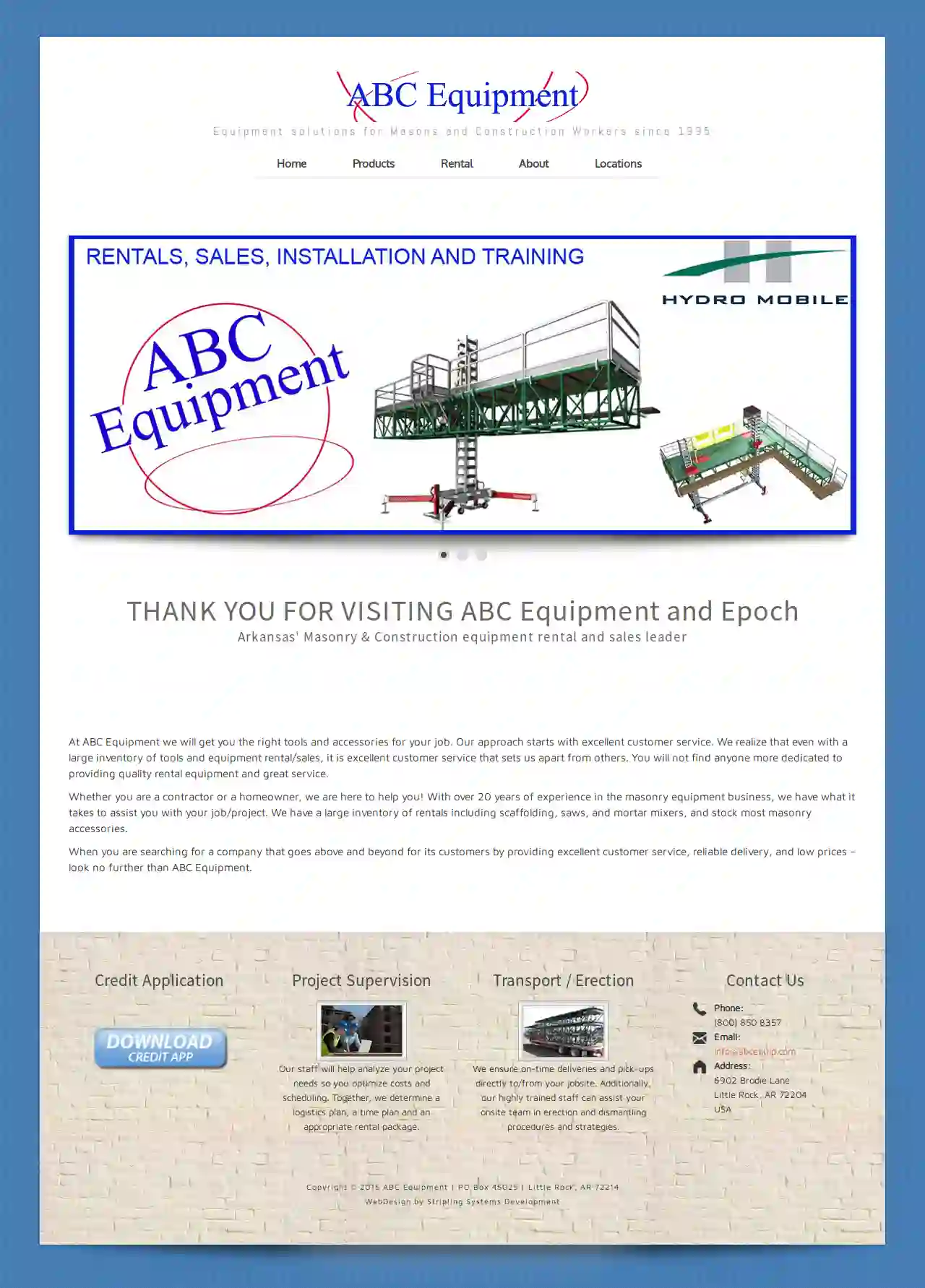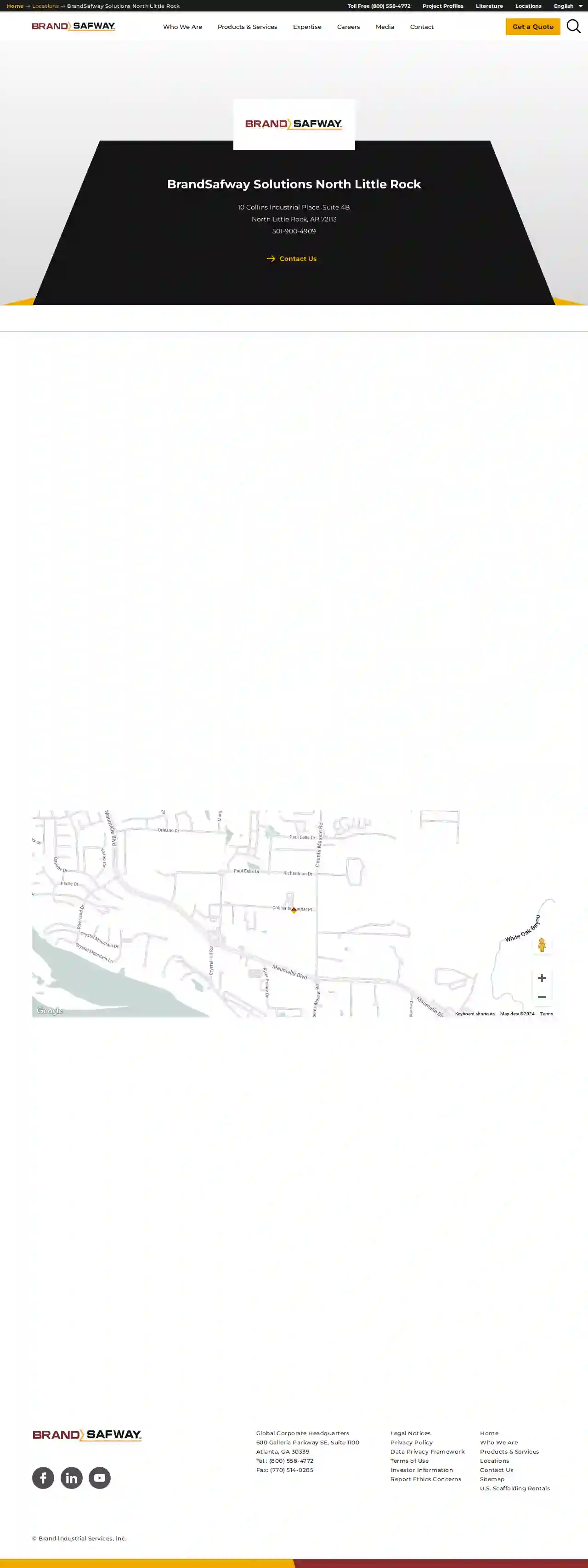Scaffolding Companies Lonoke
Top Construction Scaffolding in Lonoke
Get 3 FREE Scaffolding Builders quotes for your project today! Compare profiles, reviews, accreditations, portfolio, etc... and choose the best offer.

ABC Equipment
4.19 reviews6902 Brodie Lane, Little Rock, 72204, USABC Equipment: Your Partner in Masonry & Construction Since 1995, ABC Equipment has been a trusted provider of equipment solutions for Masons and Construction Workers in Arkansas. We understand the importance of having the right tools for the job, and we're committed to providing our customers with the highest quality equipment and exceptional customer service. Our team is dedicated to helping you succeed. We offer a wide range of rental equipment, including scaffolding, saws, mortar mixers, and a variety of masonry accessories. We also provide project supervision, transportation, and erection services to ensure your project runs smoothly. Whether you're a seasoned contractor or a homeowner tackling a DIY project, ABC Equipment is here to support you. We're proud to offer competitive prices, reliable delivery, and a commitment to exceeding your expectations. We're more than just an equipment rental company; we're your partners in success. Contact us today to learn more about how we can help you achieve your project goals.
- Services
- Why Us?
- Gallery
Get Quote
BrandSafway Solutions North Little Rock
North Little Rock, AR, 1234 Industrial Blvd, 72118, USBrandSafway is a leading provider of access solutions, including scaffolding, aerial work platforms, and forming and shoring. With a strong commitment to safety, quality, and customer satisfaction, BrandSafway offers a wide range of services tailored to meet the unique needs of clients across various industries. Their team of experienced professionals is dedicated to delivering innovative solutions that enhance efficiency and productivity, ensuring successful project outcomes.
- Services
- Why Us?
- Accreditations
- Our Team
- Testimonials
Get Quote- Un
Universal Dock & Door
Little Rock, US- Services
- Why Us?
Get Quote - Un
Universal Scaffolding & Equipment
4.33 reviewsLittle Rock, US- Services
- Why Us?
Get Quote
Over 2,353+ Scaffolding Companies in our network
Our scaffolding contractors operate in Lonoke & beyond!
ScaffoldingHQ has curated and vetted Top Scaffolding Businesses in Lonoke. Find the most reliable contractor today.
Frequently Asked Questions About Scaffolding Companies
- Traditional and highly versatile.
- Components (tubes, clamps, boards) are assembled on-site.
- Adaptable to complex shapes and structures.
- Requires skilled labor and more time for erection.
- Pre-engineered, modular components.
- Faster and easier to erect.
- Often has higher load capacities.
- May be less versatile for complex shapes.
- A larger, more complex structure typically used for accessing multiple levels of a building.
- Offers greater height and versatility.
- Often used for construction, renovation, and maintenance.
- Smaller, portable platforms usually used for tasks at a single level.
- Commonly used for painting, plastering, or light repairs.
- Can be rolling or stationary.
- Always Wear a Safety Harness: Connect your harness to a secure anchor point at all times to prevent falls.
- Keep Platforms Clear: Remove tools, materials, and debris to avoid tripping hazards.
- Never Overload the Scaffolding: Stay within the designated weight limits.
- Be Aware of Your Surroundings: Pay attention to power lines, moving equipment, and other potential hazards.
- Inspect Before Use: Check the scaffolding for any damage or defects before starting work.
- Communicate Clearly: Use hand signals and clear communication to coordinate with other workers.
- Follow Safety Training: Attend and understand all safety training provided by your employer or the scaffolding company.
What is the difference between tube and clamp scaffolding and system scaffolding?
Tube and Clamp Scaffolding:
What is the difference between scaffolding and staging?
Scaffolding:
What is a scaffolding hoist?
What are some tips for working safely on scaffolding?
What is the difference between tube and clamp scaffolding and system scaffolding?
Tube and Clamp Scaffolding:
- Traditional and highly versatile.
- Components (tubes, clamps, boards) are assembled on-site.
- Adaptable to complex shapes and structures.
- Requires skilled labor and more time for erection.
- Pre-engineered, modular components.
- Faster and easier to erect.
- Often has higher load capacities.
- May be less versatile for complex shapes.
What is the difference between scaffolding and staging?
Scaffolding:
- A larger, more complex structure typically used for accessing multiple levels of a building.
- Offers greater height and versatility.
- Often used for construction, renovation, and maintenance.
- Smaller, portable platforms usually used for tasks at a single level.
- Commonly used for painting, plastering, or light repairs.
- Can be rolling or stationary.
What is a scaffolding hoist?
What are some tips for working safely on scaffolding?
- Always Wear a Safety Harness: Connect your harness to a secure anchor point at all times to prevent falls.
- Keep Platforms Clear: Remove tools, materials, and debris to avoid tripping hazards.
- Never Overload the Scaffolding: Stay within the designated weight limits.
- Be Aware of Your Surroundings: Pay attention to power lines, moving equipment, and other potential hazards.
- Inspect Before Use: Check the scaffolding for any damage or defects before starting work.
- Communicate Clearly: Use hand signals and clear communication to coordinate with other workers.
- Follow Safety Training: Attend and understand all safety training provided by your employer or the scaffolding company.